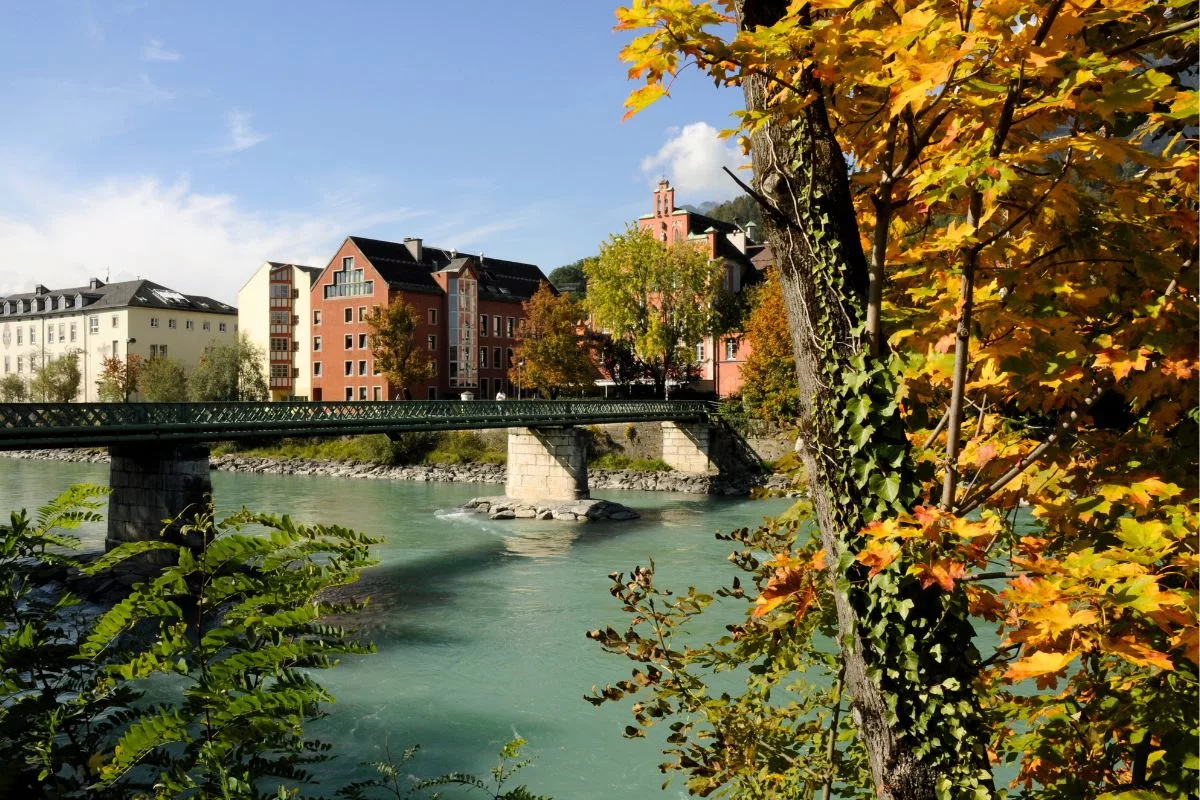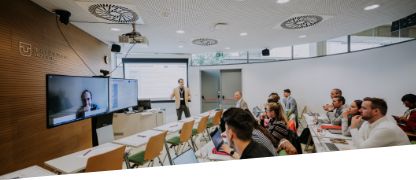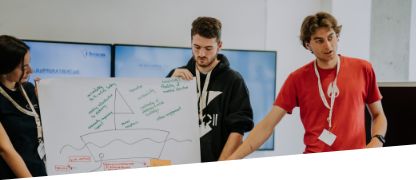Welcome guide
MCI | The Entrepreneurial School (MCI)
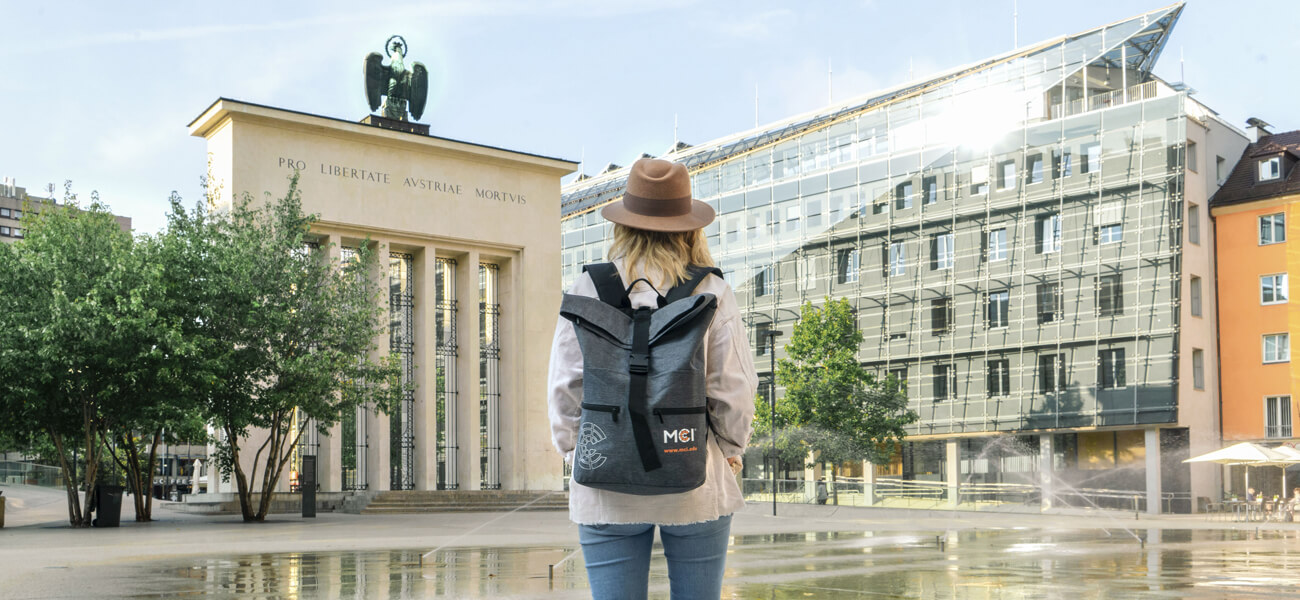
The best out of science, economy and consulting
MCI | The Entrepreneurial School® provides a meaningful connection between universities, grandes écoles, business schools, universities of applied sciences, and the world of business. It represents a strong international brand that successfully combines academic teaching and training, solution-oriented research & development, impactful knowledge transfer and innovative start-ups.
The MCI links together the best out of science, economy and consulting to the unique concept of an international Entrepreneurial University of Applied Sciences providing the platform for numerous academia-business activities including start-ups, executive education, summer & winter schools, study abroad programs, international conferences and more. It stands for internationality, academic quality, practice orientation, innovation, close cooperation with industry, solution-oriented research and development, first-class infrastructure, a high level of customer and service orientation, and international renown.
MCI empowers motivated people to achieve outstanding performance, provides profound academic competence and creates innovative know-how transfer within a strong international network.
What MCI stands for...
- Quality teaching. High quality teaching secures our position among the leading academic institutions in the German speaking world
- Intellectual contribution, transfer of know-how & start-ups. Our intellectual contribution is applied, business-relevant and solution-oriented. The transfer of know-how strengthens the location and the competitiveness of companies.
- International orientation. Our strong international orientation generates know-how, prestige and added value for our customers
- Customer and service orientation. Our customer and service orientation is exemplary
- People and culture. Our corporate culture thrives on mutual trust, diversity, commitment of our employees, entrepreneurial spirit and responsibility towards society
- Brand. MCI’s brand is internationally renowned and stands for performance, professionality, knowledge and competence
- Network. Our international network creates a competitive edge and added value for our stakeholders
- Innovation. Ongoing innovation forms the basis of our market position and ensures our competitiveness
- Infrastructure. Our excellent infrastructure creates an attractive and stimulating environment
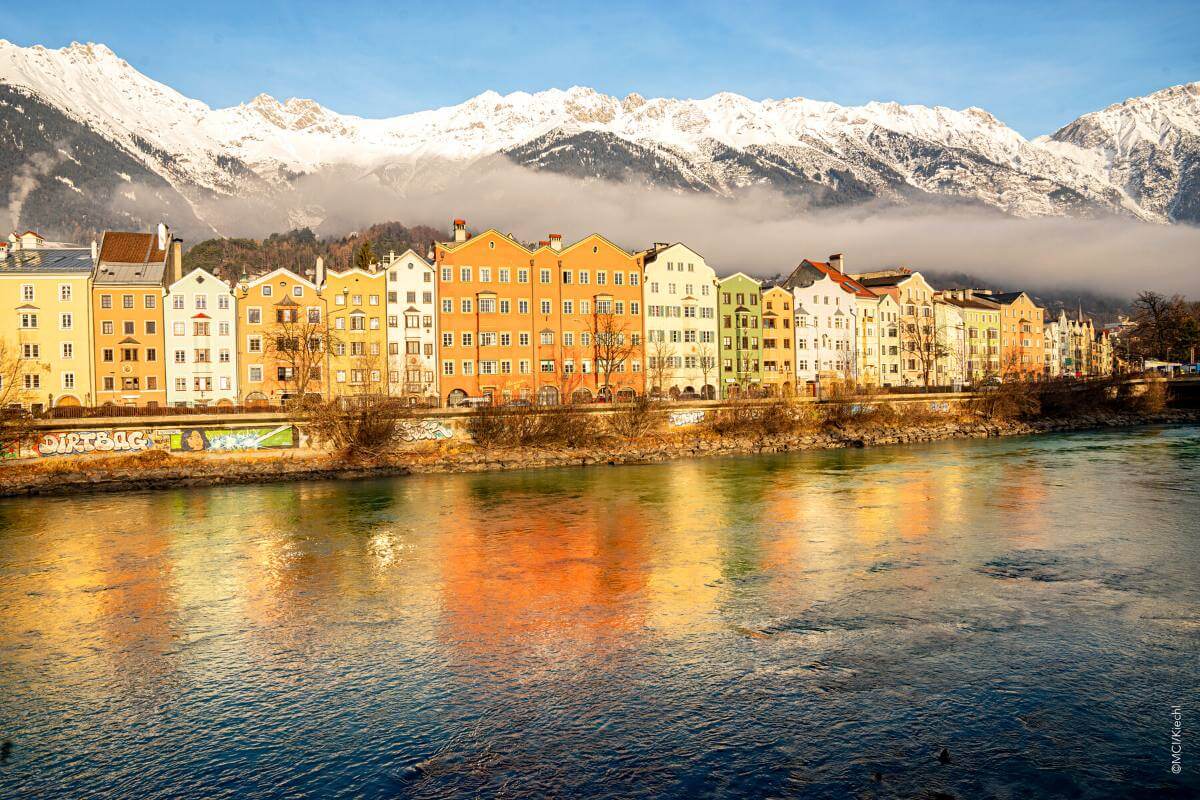
Useful information to study in Innsbruck
Budget to plan
In total, the average monthly cost of living for students is approximately €1,100. The numbers above are rough estimates which may vary depending on students’ lifestyle.
See below a breakdown of the estimated costs:
- Housing including utilities (single room or studio apartment) €330–€700
- Food and drinks €300 – €400
- Public transportation €20
- Cell phone €30
- Internet, if not included in rent €20 – €50
- Miscellaneous (books, leisure activities, trips, personal expenses etc.) €400
ID document required
In general students from the European Union can travel to Austria either with their passport or their ID card. You will also need one of these documents for registration in Innsbruck and during application for your stay at MCI.
Long Stay Visa
Stay for more than 6 months
Nationals of so-called “third countries” (any country outside the EU/EEA and Switzerland) who stay in Austria for more than 6 months need a residence permit (“Aufenthaltsbewilligung”).
Application before arrival: In person at the austrian authority in home country after travellin to Austria with Visa D, students might pick up their residence permit at “Referat für Aufenthaltsangelegenheiten”
Application after arrival. Only for students from defined countries possible. After visa-free arrival, students can pick up their residence permit in Austria “Referat für Aufenthaltsangelegenheiten“). More info here.
Stay for less than 6 months
Students who are going to stay in Austria for less than six months can apply for a Visa C (for stays of up to 90 days) or for a Visa D (for stays of from 91 days up to a maximum of 6 months) at the competent Austrian representative authority in their country of residence. These visas are free of charge. More information here.
Insurance
- Students from EU/EEA countries and Switzerland usually have insurance coverage with their European Health Insurance Card (EHIC).
- Students from certain countries (e.g. Turkey) might obtain the form A3 from their national health insurance in their home country. Once they are in Austria, they can get insurance through Österreichische Krankenkassa.
- Students from “third countries“: Some students may purchase ÖK’s student insurance (“Studierendenselbstversicherung“). Careful: not all students are eligible for this insurance; eligibility depends on a number of criteria (duration of studies, change of major, etc.). For more details please click here.
- Another possibility is to take out private health insurance. It is essential that the insurance complies with a few requirements (insurance cover well over 30,000 Euro including guarantee to cover possible recovery and repatriation costs and costs for treatment of the COVID-19 disease). For possibilities check feelsafe or care concept. Should you need more information please click here.
Banks
For students coming from third countries it might make sense to open an austrian bank account. Being enrolled as a student at MCI, opening a bank account shall be free of costs. Students will be allocated a buddy (=MCI student) who will help incoming students in order to open a bank account.
Please find below the documents require to complete this process:
- valid passport
- confirmation of enrollment (available through MCI)
Accommodation
We do advise our students to book a room in a student dorm after receiving their acceptance letter. More information may be found here:
The most convenient and usually least expensive option is to reserve a room in a student dormitory via OeAD, the Austrian Agency for International Mobility and Cooperation in Education, Science, and Research.
Finding private housing in Innsbruck may be challenging and requires considerable time and effort to find a flat share or a studio.
Ride to campus
By plane
The three big international airports near Innsbruck are Munich, Frankfurt, and Vienna. Flying into Innsbruck is the fastest way to get here, but it might also be the most expensive. Innsbruck airport is very close to the city center. Bus F brings you directly to the city center in approx. 10-15 minutes.
By train
Innsbruck is also easily accessible by train. The main station is about 10 mins. from the city center. For more information visit the website of the Austrian Railways company ÖBB. Frequent train services are also available from Vienna and Munich airport.
By bus
Flixbus from all over Europe or the airport shuttle Four Seasons Travel from Munich airport.
For all details regarding MCI campus & locations please click here.
Academic registration at the university
You will be contacted by the respective department and get more information before the start of the new semester.
Transport plan
Public transport in Innsbruck: IVB
The IVB (Innsbrucker Verkehrsbetriebe) is taking care of the public transport in Innsbruck. Depending on where you live, their network is pretty good.
There are several categories for tickets.
If you really need the bus, you might consider buying a semester ticket (september – february or march – august).
If you only use the bus from time to time, you could buy a ticket for 8 rides.
Single tickets or tickets for 24 hours are also available.
Single tickets can be bought in the bus, at ticket machines or in the IVB service centre.
The IVB also offers nightliners (i.e. buses all night long or women’s night taxis), for some parts of the city even one nightliner an hour, every night of the week. Only a few of the nightliners have special prices, most of the lines can be used with a normal ticket (no extra charge).
The timetables for the busses and trams can be found on the website of the IVB. They also have their own smartphone app, the IVB Scout.
Public transport in the Tyrol: VVT
On the website of the VVT (Verkehrsverbund Tirol) you find a lot of information on the public transport in the Tyrol, not only about the trains, but also about busses.
There are also several categories of tickets.
You can find the time schedule online and in their smartphone app VVT SmartRide.
Trains in Austria: ÖBB
Almost all trains in Austria are operated by the National Railway Company ÖBB (Österreichische Bundesbahn).
You can find the time schedule of ÖBB trains online or in their smartphone app Scotty.
If you are under the age of 26, we strongly recommend you to get an ÖBB VorteilsCard <26. This is a discount card for €19 which gives you 50% discount on any journey with the ÖBB within Austria (if you buy the ticket on the machine, 45% if you purchase it on the counter) and 25% for the distance from the Austrian border to your foreign location (only valid if you cross the Austrian border on your trip.
If you’re 26 or older, you can buy the VorteilsCard Classic, but it is more expensive and you will have to calculate if it’s worth the money.
Going around by bike
Depending on where you live, you might consider going by bike. There are many bike paths in Innsbruck and you can easily get from one point of the city to the other. Actually it’s the easiest way to get around in Innsbruck.
If you don’t have a bike of your own and you prefer buying a used one, you can check the following options.
Mobile plan
Austria has one of the highest mobile phone concentrations in the world. Thanks to the high competition, we have really low rates.
The biggest providers are: A1, 3 (Drei), Hot, bob, RedBull Mobile, T-Mobile, Telering, yesss!
Basically you can choose between two big options: a contract or a prepaid rate. As contracts often have to be concluded for a minimum of 12-24 months (“Mindestlaufzeit”), pre-paid rates might be more interesting for you. But check the different providers, there might be some who allow you to withdraw from your contract earlier.
If you chose to conclude a contract, you might need an Austrian bank account.
Charging your prepaid card is easy: you can buy the credits for charging your prepaid card (“Guthaben”) at the respective mobile phone shops, supermarkets, newspaper stands, post offices and petrol stations.
Health insurance
Students from EU/EEA countries and Switzerland usually have insurance coverage with their European Health Insurance Card (EHIC).
Students from certain countries (e.g. Turkey) might obtain the form A3 from their national health insurance in their home country. Once they are in Austria, they can get insurance through Österreichische Krankenkassa.
Students from third countries may purchase ÖK’s student insurance (“Studierendenselbstversicherung“). Careful: not all students are eligible for this insurance; eligibility depends on a number of criteria (duration of studies, change of major, etc.)
Another possibility is to take out private health insurance. It is essential that the insurance complies with a few requirements (insurance cover well over 30,000 Euro including guarantee to cover possible recovery and repatriation costs and costs for treatment of the COVID-19 disease). For other options please visit www.feelsafe.at or www.care-concept.de.
Foreign policy
It is mandatory for ALL international students to register within 3 days after their arrival:
- Necessary documents:
- Meldezettel
- valid passport
Referat Melde- und Einwohnerwesen, Passangelegenheiten
Rathausgalerie Maria-Theresien-Str. 18 (1st floor Stock)
Nationals of EU/EEA (EWR) countries and Switzerland have to apply for a confirmation of registration (“Anmeldebescheinigung“) at the registration office within four months upon arrival. For specific questions, contact:
Referat für Aufenthaltsangelegenheiten, Rathausgalerie, Maria-Theresienstr. 18, ground floor („Hochparterre“ – Hintereingang bei Drogerie Müller).
Documents needed and more information:
- completed/signed application form (available through International Relations Office)
- Passport or national ID
- proof of health insurance (e.g. European Health Insurance Card – EHIC, insurance contract, etc.)
- proof of sufficient financial means (e.g. bank statement of Austrian bank, traveler cheques, Erasmus contract, etc.)
- confirmation of admission/enrollment (”Inskriptionsbestätigung“) – students can download this document from myMCI once they are enrolled at MCI and have paid all their fees.
- Fee of app. € 15, further fees may apply
Attention: Non-compliance with this regulation can lead to a fine up to €250
Residency permits
Stay for more than 6 months
Nationals of so-called “third countries” (any country outside the EU/EEA and Switzerland) who stay in Austria for more than 6 months need a residence permit (“Aufenthaltsbewilligung”).
Application before arrival: In person at the austrian authority in home country after travellin to Austria with Visa D, students might pick up their residence permit at “Referat für Aufenthaltsangelegenheiten”
Application after arrival. Only for students from defined countries possible. after visa-free arrival, students can pick up their residence permit in Austria “Referat für Aufenthaltsangelegenheiten“). More info here.
Introduction
MCI | The Entrepreneurial School® provides a meaningful connection between universities, grandes écoles, business schools, universities of applied sciences, and the world of business. It represents a strong international brand that successfully combines academic teaching and training, solution-oriented research & development, impactful knowledge transfer and innovative start-ups.
The MCI links together the best out of science, economy and consulting to the unique concept of an international Entrepreneurial University of Applied Sciences providing the platform for numerous academia-business activities including start-ups, executive education, summer & winter schools, study abroad programs, international conferences and more. It stands for internationality, academic quality, practice orientation, innovation, close cooperation with industry, solution-oriented research and development, first-class infrastructure, a high level of customer and service orientation, and international renown.
MCI empowers motivated people to achieve outstanding performance, provides profound academic competence and creates innovative know-how transfer within a strong international network.
This is what MCI stands for:
- Quality teaching. High quality teaching secures our position among the leading academic institutions in the German speaking world
- Intellectual contribution, transfer of know-how & start-ups. Our intellectual contribution is applied, business-relevant and solution-oriented. The transfer of know-how strengthens the location and the competitiveness of companies.
- International orientation. Our strong international orientation generates know-how, prestige and added value for our customers
- Customer and service orientation. Our customer and service orientation is exemplary
- People and culture. Our corporate culture thrives on mutual trust, diversity, commitment of our employees, entrepreneurial spirit and responsibility towards society
- Brand. MCI’s brand is internationally renowned and stands for performance, professionality, knowledge and competence
- Network. Our international network creates a competitive edge and added value for our stakeholders
- Innovation. Ongoing innovation forms the basis of our market position and ensures our competitiveness
- Infrastructure. Our excellent infrastructure creates an attractive and stimulating environment
Academic calendar
| Fall semester | Spring semester | |
| Start of Semester | September / October* | March |
| End of Semester | December / February* | June |
The semester dates include the orientation program, classes and exams (first attempts). For further details, please check our website.
Short programs
MCI offers students and partner universities short programs giving a taste of the city and the learning experience at MCI. Students can join our 3-4 week winter or summer programs and develop in-depth knowledge. For more information please click here.
Language courses for international students
Here is a brief insight into our program offered within the language center. German courses are offered for our international students from across the world! A wide variety of language courses: Spanish, French and Italian across different levels.
Tandem Language Program: Apart from taking part in a language course there is also the opportunity to practice conversation skills or intercultural skills by joining our free Tandem Program! Register and get in contact! Find more information, course descriptions, schedules and the online registration system on our website www.mci.edu/languages (in order to access detailed information you will have to LOGIN using your MCI Login).
Libraries
The MCI provides libraries and study areas with a wide selection of books, journals, magazines and newspapers at multiple locations as well as comprehensive online resources.
In addition to its own Library Services, the MCI has signed a cooperation agreement with the University and State Library of Tyrol (ULB) that provide MCI’s teachers, students and researchers with full access to the university library facilities. For more information please click here.
Canteens
Student can join the Mensa Club in order to get a discount in the official canteens.
Students’house: wrong title. Should it be Psychological Support for students? For more information we have an own website.
Activities at university
Students studying at MCI might register for a sport class offered from the sport institute of the University Innsbruck. For more information please click here.
International relations contacts
MCI Management Center Innsbruck
Universitaetsstrasse 15
6020 Innsbruck
Austria / Europe
Email: incoming@mci.edu
URL: www.mci.edu/en/international
Social media: www.facebook.com/MCIInternationalRelationsOffice
Counselling services for students’
For students who are in need of a psychological treat, receive free counseling. For more infomation please click here.
Alumni
As a bustling platform, MCI Alumni & Friends promotes the cultivation of contacts, professional careers, personal development and positive reputation of its graduates.
MCI feels committed to its students and alumni beyond graduation and aims to offer them an academic home and attractive benefits in line with its appealing motto “We accompany motivated people”. This includes high-profile events, annual Alumni Weekends, the legendary MCI Summer Lounge, attractive continuing education opportunities, symposia, scientific expertise, personal coaching, professional support for business start-ups and much more.
For more information please click here.
Extra scholar activities
The leisure program in Innsbruck is huge and diverse. The possibilities seem to be limitless in the capitals of the Alps. Here you can go skiing & snowboarding, mountainbiking, canyoning and route and do many more activities. More information here.
Student jobs
Whether or not you are allowed to work in Austria depends on your nationality, the kind of work you would like to undertake and – for nationals of third countries – also on the kind of residence title. Nationals of Belgium, Bulgaria, Croatia, Cyprus, Czech Republic, Denmark, Estonia, Finland, France, Germany, Greece, Hungary, Iceland, Ireland, Italy, Latvia, Liechtenstein, Lithuania, Luxemburg, Malta, Netherlands, Norway, Poland, Portugal, Romania, Slovakia, Slovenia, Spain, Sweden or Switzerland are allowed to work in Austria without any permit (e.g., work permit) being required. More Information here.
Tips
- Download the VVT smart ride or ÖBB Scotty app to get yourself around the city and surroundings
- Buy the semester ticket or a bicycle as soon as possible (you can easily sell it at the end)
- You might consider buying the Freizeitticket, if you plan to ski and hike regularly.
- Pick up your skiing equipment and be prepared for cold temperatures and a great time in the snow (in fall semester). But no worries fi you come in spring, skiing will also be possible in the summer term.
- Make a sunrise hike at one of the mountains around Innsbruck.
- Ask your mom for her secret recipe, practice it a few times before you come to Innsbruck and start your dorm life (share it with others in the kitchen)
- Make sure to carry at least some cash (€) with you as most credit cards will not be accepted.
- Pay attention to the opening hours of the shops (most of them are closed on Sundays and close earlier on Saturdays)
- There might be challenges, cultural shocks or even disasters to come, but more laughter memories are awaiting you.
- Keep updated what’s going on around town, also through Facebook.
- Get familiar with German, at least know basic phrases.
- Don’t worry if you have a budget. Learn to cook and when you get to have a common kitchen in your dorm, you would be able to spend only 3 – 4 € to have a decent meal.
- Innsbruck is a very centric city in Europe and Flixbus is always a wise choice.
- Go up Nordkette and Enjoy the Beautiful View.
- Try to be proactive in class and also embrace all the different teachers and what they have to offer.
- If you ever get lost, don’t be afraid to ask for help. Everyone will be happy to help you.
To do list
Situated in the heart of the Alps, the two-time host of the Winter Olympics and highend tourist destniation Innsbruck provides a wealth of year-round sports and leisure opportunities. More Information.
Students associations
Erasmus Student Network (ESN)
ESN is one of the biggest interdisciplinary student associations in Europe. One of the networks of ESN is also based in Innsbruck. More information
Austrian Student Union (ÖH)
The Austrian National Union of Students’ federal body of Representatives is the legal representative of all students to the competent ministries. Also at MCI students are legally represented through ÖH. More information
City maps
Map with important spots in and around Innsbruck.
Emergency
- Keep separate copies of your passport
- Register at respective Federal Ministry for External Affairs / Embassy e.g. the BMEIA website or download BMEIA app
- Note emergency numbers in your host destination (112 Europe Emergency Number; 122 Fire Brigade; 133 Police; 144 Amublance; 140 Mountain Rescue)
Pharmacies and doctor appointments
Hospitals
Austria has a very good health care system and especially the main hospital in Innsbruck (Landeskrankenhaus Universitätsklinik Innsbruck) has an excellent reputation. It is a very big complex about 10 minutes by foot from the Golden Roof.
In Austria people go directly do the hospitals only in case of emergency (accident, etc.). If person feel sick they firstly got to a doctor.
Doctors
There is a list of all doctors (“niedergelassener Arzt”) in Tyrol. You can look for the type of doctor (general practicioner, gynaecologist, etc.) as well as for the name or the adress of the doctor. You can even check if there’s a doctor speaking your mother tongue (“erweiterte Suche” –> “Fremdsprachen”).
A general practitioner is called “Allgemeinmediziner”, “praktischer Arzt” or “Hausarzt”.
Before going there, please check if your medical insurance will take over the costs or if you will have to pay them yourself.
Pharmacies
There are many pharmacies in Innsbruck. They’re usually open until 18h00, some close during lunch time.
Every night another pharmacy takes over the “emergency service”. They’re open all night long, but they’re allowed to demand a surcharge on the normal price of their products (usually around 3 to 4 €). If you don’t know which pharmacies are doing the emergency service, check the Internet or just go to the nearest pharmacy, they always display the names & addresses of today’s emergency pharmacy at their front door.
Do’s and don’ts
- Every culture has a few of its own customs that tourists need to be aware of if they want to stay on the right side of the locals. Follow these tips and you’ll have a great time in Austria!
- Mistake Austria for Germany – not the same country J
- Do not forget to tip waiters (recommended about 10 %)
- Do not ignore the traffic light – if you walk on when it is red, you might be fined
- Do not expect Stores to be Open on Sundays
- Make sure to taste Schnitzel, Strudel and Knödel – they are delicious
- Do not mention the Film “Sound of Music” – probably no Austrian will know this film, or is interested in talking about it 😉
- Do not ask Austrian if they wear Tracht or Lederhose, or where their purple cows are
- Don’t salute without keeping eye contact. Start to drink only after everyone did salute.
Green Mobility in Innsbruck
Would you like to move around in Innsbruck in the most sustainable way? This guide provides practical examples of how to reduce greenhouse gas emissions and pollution from the transport sector. Check out our list of tips on public transportation in Innsbruck, cycling in the city & other means of transportation, how to live sustainably in the region and the support offered by MCI The Entrepreneurial School in this regard.
